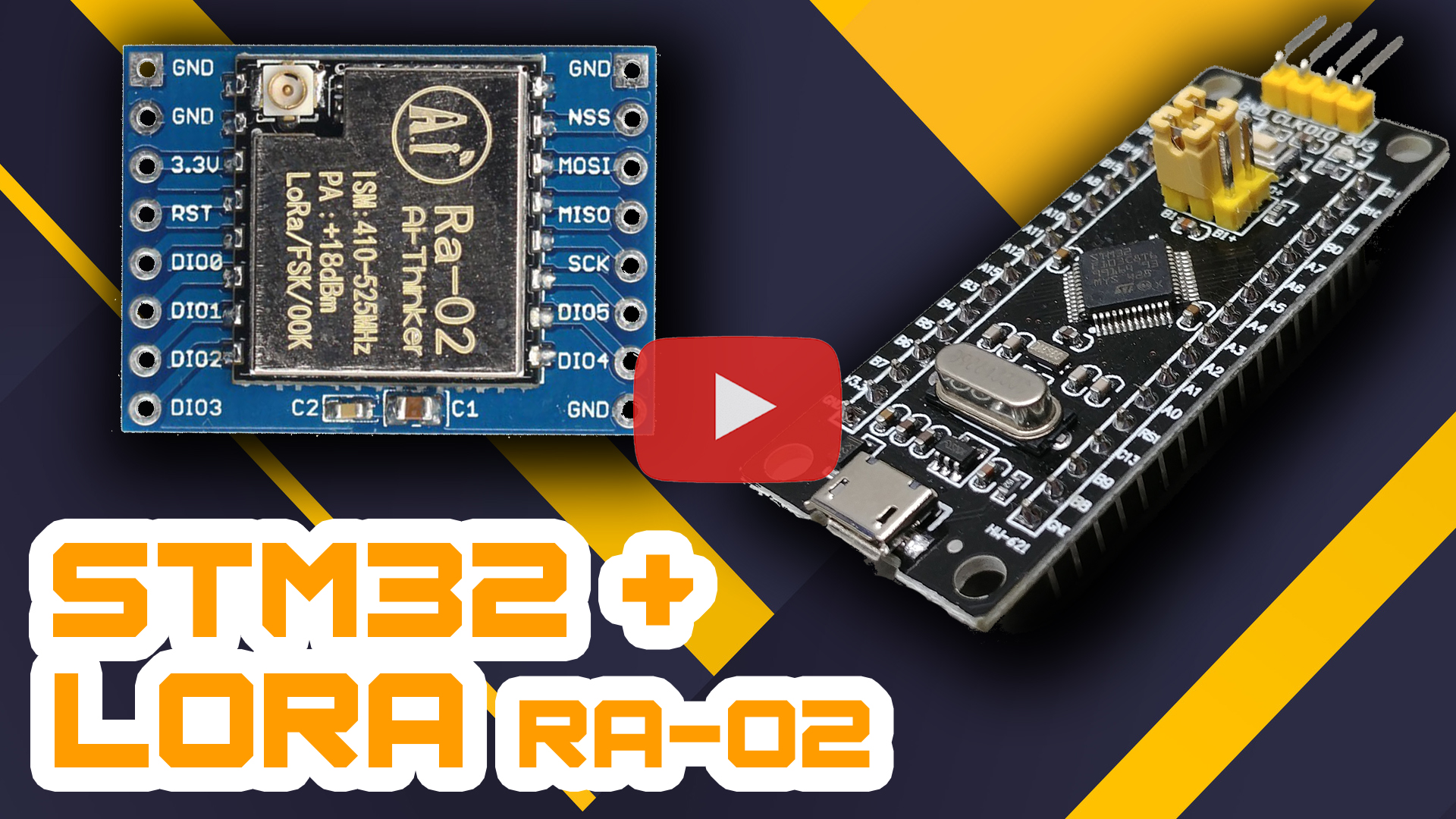SMotlaq LoRa Save
Ra-02 LoRa module (SX1278) library for STM32 (ARM processors) using HAL drivers ⚡
Outlines
- Tutorial video
- Features
- Successfully tested on
- Star history
- Contact
- Hardware:
- Installation
- Initial configurations
- Transmitting Data
- Receive Data
- Signal power estimation
Donate
Is it helpfull?
Tutorial video
Features
- Full access to LoRa settings including bandwidth, spreading factor, carrier frequency, coding rate etc.
- Over current protection
- Transmiting and receiveing data
- Sleep mode access for power saving (especially for battery powered systems)
- RSSI estimation
- Easy to use :)
Successfully tested on:
- F103C8
- F103RE
- F030C8
- F411VE (Discovery board)
- F429ZG
- L476RG (Nucleo-L476RG)
Contact
Telegram or E-mail: [email protected]
Star history
Hardware
Requirements
- Ra-02 LoRa module with SX1278 chip
- 433MHz antenna
- STM32 microcontroller
Wiring
The wire connections are like following:
| STM pin | Module pin |
|---|---|
| SPI MISO | MISO |
| SPI MOSI | MOSI |
| SPI CLK | CLK |
| a GPIO output (initially HIGH) | NSS |
| a GPIO output (initially HIGH) | RST |
| a GPIO input (EXTI - Rising edge) | DIO0 |
| 3.3v | 3.3v |
| GND | GND |
Installation
Download or copy LoRa.c and LoRa.h , import them into your project and then include LoRa.h in main.c:
#include "LoRa.h"
Initial configurations
First of all, you'll have to create a LoRa object:
LoRa myLoRa;
Then you'll have to call its constructor in your main function:
myLoRa = newLoRa();
Now, the default settings are set in myLoRa, but you must set 7 important parameters:
- NSS pin
- NSS port
- Reset pin
- Reset port
- DIO0 port
- DIO0 pin
- The SPI used for communication
myLoRa.CS_port = NSS_GPIO_Port;
myLoRa.CS_pin = NSS_Pin;
myLoRa.reset_port = RESET_GPIO_Port;
myLoRa.reset_pin = RESET_Pin;
myLoRa.DIO0_port = DIO0_GPIO_Port;
myLoRa.DIO0_pin = DIO0_Pin;
myLoRa.hSPIx = &hspi3;
Now, calling LoRa_init(), will write these settings in the module's memory.
LoRa_init(&myLoRa);
This function returns a "status code" to represent module response status. The status codes are:
-
200: LORA_OK - Everything is OK. -
404: LORA_NOT_FOUND - Your microcontroller can't communicate with the LoRa module and read the RegVersion. -
503: LORA_UNAVAILABLE - Something in LoRa's settings (i.e. NSS port/pin, RESET port/pin or SPI handler) is not correct.
Other status codes:
-
413: LORA_LARGE_PAYLOAD - Your data is larger than 255 bytes.
Example
#include "stdio.h"
#include "string.h"
.
.
.
char send_data[200];
uint16_t LoRa_status = LoRa_init(&myLoRa);
memset(send_data,NULL,200);
if (LoRa_status==LORA_OK){
snprintf(send_data,sizeof(send_data),"\n\r LoRa is running... :) \n\r");
LoRa_transmit(&myLoRa, (uint8_t*)send_data, 120, 100);
HAL_UART_Transmit(&debugUART, (uint8_t*)send_data, 200, 200);
}
else{
snprintf(send_data,sizeof(send_data),"\n\r LoRa failed :( \n\r Error code: %d \n\r", LoRa_status);
HAL_UART_Transmit(&debugUART, (uint8_t*)send_data, 200, 200);
}
Other parameters are set like the following:
myLoRa.frequency = 434; // default = 433 MHz
myLoRa.spredingFactor = SF_9; // default = SF_7
myLoRa.bandWidth = BW_250KHz; // default = BW_125KHz
myLoRa.crcRate = CR_4_8; // default = CR_4_5
myLoRa.power = POWER_17db; // default = 20db
myLoRa.overCurrentProtection = 130; // default = 100 mA
myLoRa.preamble = 10; // default = 8;
Spreading factor values
//--- SPREADING FACTORS ---//
SF_7 7
SF_8 8
SF_9 9
SF_10 10
SF_11 11
SF_12 12
Bandwidth values
//------- BANDWIDTH -------//
BW_7_8KHz 7.8 KHz
BW_10_4KHz 10.4 KHz
BW_15_6KHz 15.6 KHz
BW_20_8KHz 20.8 KHz
BW_31_25KHz 31.25 KHz
BW_41_7KHz 41.7 KHz
BW_62_5KHz 62.5 KHz
BW_125KHz 125 KHz
BW_250KHz 250 KHz
BW_500KHz 500 KHz
Coding rate values
//------ CODING RATE ------//
CR_4_5 4/5
CR_4_6 4/6
CR_4_7 4/7
CR_4_8 4/8
Power values
//------ POWER GAIN ------//
POWER_11db 11db
POWER_14db 14db
POWER_17db 17db
POWER_20db 20db
Over current protection
The maximum current must be a multiple of 5 if it is less than 120, and a multiple of 10 if it is greater than 120. The minimum value is 45 mA and the maximum is 240 mA. See this file to learn about allowed currents.
Transmitting Data
After these configurations, now you can transmit a set of bytes using the LoRa_transmit function:
uint8_t LoRa_transmit(LoRa* _LoRa, uint8_t* data, uint8_t length, uint16_t timeout)
NOTE: After calling this function, the FiFo data buffer will be cleared. It means that all received packets will be deleted. If you want to read data just after transmitting something, you should add a delay.
Arguments:
-
_LoRa: Your LoRa object -
data: A pointer to the data you wanna send -
length: Size of your data in Bytes -
timeOut: Timeout in milliseconds
Returns:
-
1in case of success,0in case of timeout
Example:
char* send_data;
send_data = "Hello world!";
LoRa_transmit(&myLoRa, (uint8_t*)send_data, 12, 100);
char* send_data;
send_data = "Hello world!";
if(LoRa_transmit(&myLoRa, (uint8_t*)send_data, 12, 100) == 1){
HAL_GPIO_WritePin(LED_GPIO_Port, LED_Pin, GPIO_PIN_SET);
}
Receive Data
LoRa modules have two receive modes:
- Single
- Continuous
This library only supports "Continuous mode".
First of all, you'll have to enable receiving data:
LoRa_startReceiving(&myLoRa);
This function changes operating mode from STANDBY to RXCONTINUOUS, and after that you can store the last received packet in a variable by calling LoRa_receive. You can call LoRa_receive in a timer interrupt callback (recommended) or in your main loop.
uint8_t LoRa_receive(LoRa* _LoRa, uint8_t* data, uint8_t length)
Arguments:
-
_LoRa: Your LoRa object -
data: A pointer to the array that you want to write received bytes in. -
length: The number of bytes you want to read.
Returns:
- The size of recieved packet in bytes.
Example:
LoRa_startReceiving(&myLoRa);
uint8_t received_data[10];
uint8_t packet_size = 0;
while(1){
packet_size = LoRa_receive(&myLoRa, received_data, 10);
Hal_Delay(500);
}
Signal power estimation
The SX127x series can measure the power of the last received packet. The LoRa_getRSSI(...) can do this.
int LoRa_getRSSI(LoRa* _LoRa)
Arguments:
-
_LoRa: Your LoRa object
Returns:
- An integer representing the power in dBm. For example -43.







/i/69669/products/2018-02-09T16%3A46%3A57.338Z-Lora%2002%20breakout%20board_1.JPG)
